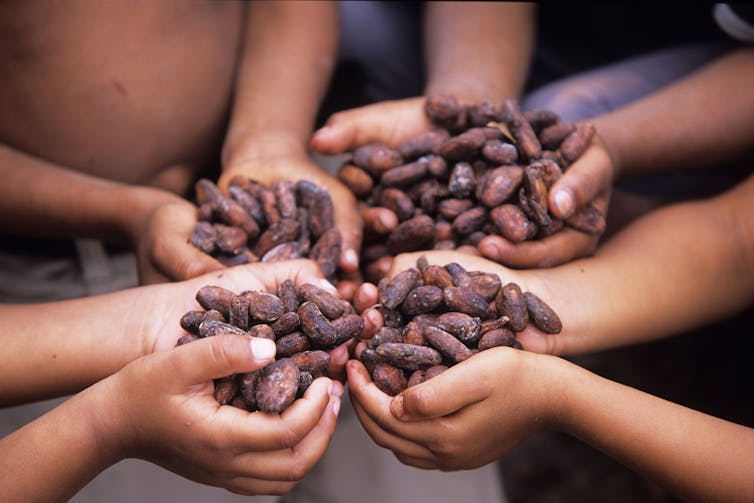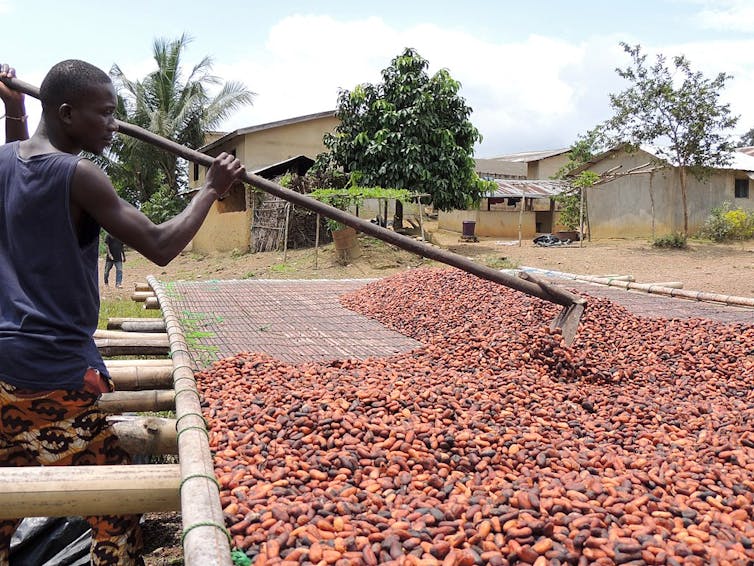April 7, 2020
Turning to Easter eggs to get through these dark times? Here's the bitter truth about chocolate
More work is needed by big chocolate companies to ensure cocoa is produced sustainably and fairly.
The coronavirus might make Easter celebrations a little subdued this year, but that doesn’t mean going without chocolate eggs. In fact, South Australia’s chief public health officer Nicola Spurrier reportedly said people should “to cheer ourselves up … I’ve certainly got a good supply of chocolate eggs already”.
But before you fill your shopping trolley (online or virtual) with chocolate, we urge you to think twice about whether it’s ethically produced.
Read more:
Most chocolate consumed globally, including in Australia, comes from the in West Africa - which together account for about 60% of global cocoa supply.
Cocoa farming is a in the region. Despite growing global demand for chocolate, farmers , and continues to plague the industry.

Spotlight on Nestlé
The US Department of Labor has estimated that carry out hazardous work on cocoa farms in Ghana and the Ivory Coast.
has examined Nestlé, which its chocolate produced for specific markets is sustainably sourced and produced. A number of its chocolate products are certified through the and schemes.
Nestlé has adopted the Fair Labor Association (FLA) that forbids child or forced child labour, and requires certain health and safety standards, reasonable hours of work and fair pay. Nestlé’s also outlines the company’s commitment to sustainability in its Ivory Coast cocoa supply chain.
Read more:
But a 2016 FLA report said 80% of Nestlé’s cocoa procurement took place outside this plan. Of this part of the supply chain, just 30% was monitored by certification systems.
For the 70% of Nestlé cocoa farms outside certification programs, there was no evidence of training on labour standards or monitoring of working conditions. Assessors also found issues such as child labour, and health and safety issues.
More recently, Nestlé its cocoa plan now covers 44% of its global cocoa supply, and the company is committed to sourcing 100% of cocoa under the plan by 2025.
On the issue of child labour, Nestlé it was “not proud” to have found more than 18,000 children doing hazardous work since a monitoring and remediation system began in 2012.
However the company would continue trying to eradicate the practice, including “helping children to stop doing unacceptable activities and, where needed, helping them to access quality education.”

Sweet sorrow: an industry problem
Other big chocolate players, such as Mars, Cadbury (owned by Mondelēz International), Hershey and Ferrero are also exposed to problems facing cocoa farming.
Many are taking action. Ghana and the Ivory Coast in setting a floor price for cocoa, to increase the money paid to farmers.
, Ferrero promised to remove slavery from its cocoa supply by 2020.
Others have made moves towards , including Hershey, it pays certification premiums to farmer groups who meet labour standards.
But despite years of pledges, progress across the sector is slow. The Washington Post major chocolate companies had missed deadlines to remove child labour from their cocoa supply chains in 2005, 2008 and 2010. It said brands such as Hershey, Mars and Nestlé could still not guarantee their chocolates were produced without child labour.

Bad for the planet
Cocoa farming is a major driver of deforestation as farmers to clear farmland. For example in 2017, cocoa traders selling to Mars, Nestlé, Mondelez and other big brands had sourced beans grown illegally inside protected rainforest areas in the Ivory Coast.
Rising demand for chocolate - – also encourages farmers to increase cocoa yield by using fertilisers and pesticides.
A found the chocolate industry in the UK produces the equivalent of more than of carbon dioxide each year. It took into account chocolate’s ingredients, manufacturing, packaging and waste.
And by the CSIRO showed it takes 21 litres of water to produce a small chocolate bar.
Read more:
In response to the problem, and have pledged to make their cocoa supply chain sustainable by 2025. Ferrero has committed to source 100% sustainable cocoa beans by 2020, and to reduce greenhouse gas emissions by 10% by 2025, based on 2018 levels.
But pledges do not necessarily transform into action. At a United Nations climate change conference in November 2017, big chocolate producers and the governments of Ghana and the Ivory Coast stopping deforestation for cocoa production. A year later, satellite mapping thousands more hectares of rainforest in West Africa had been razed.

What’s a chocolate lover to do?
Given the above, you might be tempted to stop buying chocolate brands that source cocoa from West Africa. But this would cut off the incomes of poor cocoa farmers.
Instead, choose chocolate independently certified by the , or Fairtrade. This increases the chance that the cocoa was produced with minimal environmental damage, and workers are treated well.
If you can, check if the company has direct connections with producers, which means farmers are .
If all this sounds too hard to work out yourself, websites such as , or can help you find Easter eggs that are both ethically made, and delicious.
Read more:
, Senior Lecturer, ; , Lecturer in Accounting, , and , Associate Professor - Department of Accounting and Corporate Governance,
This article is republished from under a Creative Commons license. Read the .
UOW academics exercise academic freedom by providing expert commentary, opinion and analysis on a range of ongoing social issues and current affairs. This expert commentary reflects the views of those individual academics and does not necessarily reflect the views or policy positions of the ÁñÁ«ÊÓƵapp of ÁñÁ«ÊÓƵapp.
:format(jpg)/prod01/channel_3/assets/media-centre/Easter-eggs-809X563.jpg)